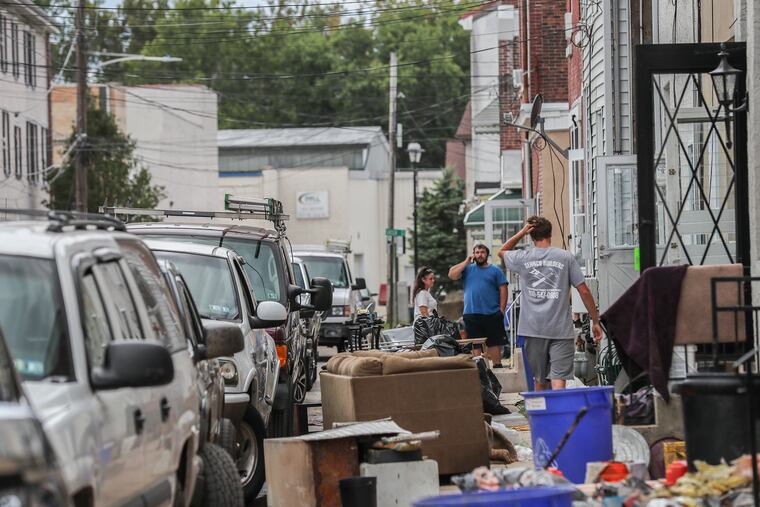Towns hit by Ida are buying water rescue boats and applying for grants, but ‘there’s no one solution’ for severe flooding
New infusions of federal funding and local flood-preparedness efforts can't allay nerves about the looming start of the Atlantic hurricane season.

On each side of the Schuylkill, Norristown and Bridgeport officials are thinking about future floods.
Norristown’s fire department is getting a high-water vehicle for rescues. Bridgeport is set to buy two rescue boats and a trailer. Volunteer firefighters are going through advanced water rescue training.
Along with new infusions of federal funding, the steps are among many local flood-preparedness efforts happening as the recovery from Hurricane Ida remains ongoing. But the patchwork of efforts in the Philadelphia region and beyond can’t allay nerves about the looming start of the next Atlantic hurricane season.
“It’s a difficult position to be in,” said Bridgeport Borough Manager Keith Truman. “We have a significant portion of our land and our population located within the floodplain.”
As climate change boosts the severity and frequency of extreme weather — and bureaucracy features in efforts at every governmental level — preventing the consequences of severe weather is far from simple.
“This is a huge issue, and it’s getting worse,” said Drew Shaw, who oversees environmental planning for the Montgomery County Planning Commission. “There’s no one solution.”
» READ MORE: ‘I can’t get out’: These families lost their homes in Hurricane Ida. They’re stuck in hotels six months later.
Since Ida hit, millions have come into Pennsylvania and New Jersey through the federal mechanisms for disaster relief — FEMA assistance for public projects and individual residents, small business loans, National Flood Insurance Program payouts, and grant funding.
Some of that money has just arrived: Last week, Pennsylvania was promised $5.7 million in federal funding to hire case managers to work with Ida victims who are still displaced in Bucks, Montgomery, and York Counties, said Pennsylvania Emergency Management Agency Deputy Director for Recovery Stephen Bekanich.
The feds also released long-awaited funding at the end of March, sending $98 million to Philadelphia, $23 million to Pennsylvania, and $228 million to New Jersey for recovery efforts. The states and city will distribute money to residents, businesses, state and county agencies, and nonprofits.
Another new grant initiative will provide $10 million to New Jersey and $5 million to Pennsylvania for disaster survivors who are insured through the National Flood Insurance Program and whose homes have been repeatedly flooded. Grants will go toward projects such as retrofitting, flood-proofing, and elevating or moving properties.
Bridgeport is one place that hopes to take advantage of federal funding. Officials have applied to a FEMA grant program that would allow them to acquire and demolish homes in the floodplain, creating a permanently preserved open space, said Truman. Working with willing property owners, the program could allow the borough to reduce the number of homes in the highest-risk area.
“Bridgeport is a river community set on a hill, so everybody … in that floodplain is going to continue to be at risk of flooding moving forward,” Truman said. “It’s not a reasonable expectation to think that every commercial and residential property owner down there has the means or the ability to retrofit their buildings to current national flood standards.”
The borough is also setting up a reverse-911 emergency alert system for contacting residents. Norristown officials are seeking grant money to study flood mitigation around Elmwood Park, which was flooded by Ida, and a new authority was formed to address stormwater management, said Township Manager Kevin Tustin.
» READ MORE: Another busy Atlantic hurricane season is likely, forecasters say
Ida was estimated to have caused $117 million in damages to roads, bridges, and other public infrastructure across Pennsylvania; about 570 public repair projects are planned. They can take months or years to complete — projects after storms Lee and Irene in 2011 lasted as long as eight years — and it may be another year or two before the state has a total cost for fixing all the damage, said Bekanich, the PEMA deputy director.
He estimated that the Ida recovery is “right on track where we need to be.” But, Bekanich added, “the potential for an additional tropical storm impacting that area only grows as summer approaches.”
» READ MORE: FEMA’s new insurance system aims to make premiums fairer as climate change raises flooding risks
Montgomery County planners are hoping to secure grant funding to restart a stormwater management program for the Perkiomen Creek watershed, parts of which were hit hard by Ida and other thunderstorms last year, said Shaw.
Their counterparts in Bucks County are bringing in additional emergency training for county and local staff members, recognizing severe weather, especially flooding, will be an increasing focus of their efforts, said Audrey Kenny, Bucks County’s emergency services director.
“We’ve been identifying what we’ve seen as bigger issues that have affected Bucks County,” said Kenny, “and almost exclusively, they’ve been severe weather events. Flooding is the most common emergency that we see anywhere in the state.”